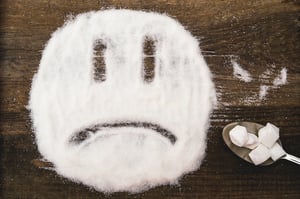
Nutritional Psychology.
Nutritional psychology is gaining momentum. Multiple studies are suggesting a relationship between nutrition and mental health. These studies found that a diet including: fruits, vegetables, fish, olive oil, nuts and legumes may reduce the chance of developing depression. Diet has also been found to improve depression severity.
Mechanisms such as micronutrients (vitamins & minerals), type of dietary fat, impact of food in the microbiome, and influence of dietary sugar have been studied in respect to the role played on mental health. Sugar is thought to impact mental health through several pathways. Indirectly, sugar influences the gut microbiome which in turn influences general health. It also directly affects the brain through its manipulation of blood glucose levels along with possible mechanisms.
Glycemic load may be relevant in the pathogenesis and treatment of mental illnesses including depression and anxiety. Studies found a highly significant correlation between sugar consumption and depression prevalence. An animal study fed mice a high refined carbohydrate diet for 12 weeks and observed an increase in anxiety and depression behaviors. One potential mechanism for the impact of dietary sugar on mental health is the triggering of reactive hypoglycemia. Ingestion of high-GI foods results in an increase in blood glucose, however a large compensatory insulin release can result in reactive hypoglycemia which is associated with an acute increase in epinephrine, contributing to neuropsychiatric symptoms including: anxiety and symptoms associated with anxiety. Induction of hypoglycemia in a lab setting has been shown to have a negative impact on mood, hedonic tone and energy levels to produce an increase in tense arousal.
Another potential mechanism bridging mental health and glycemic load is oxidative stress. Elevated blood glucose levels promotes OS by increasing the generation of reactive oxygen species, reactive nitrogen species, lipid peroxidation, protein oxidation and decreasing antioxidant levels. Oxidative stress and inflammation have been implicated in the development of depression.
Health begins in the gut. Our gut bacteria affects our production of serotonin (the feel good hormone) and its precursor, tryptophan. Both regulate our stress responses, modulate cognition and monitor our behaviors.
We offer Empire City Labs 22 stool pathogen G.I. test which is free if they accept your insurance.
Complex carbohydrates, plant-based foods, fruits and vegetables and fermented foods positively affect our microbial gut bacteria composition. Unhealthy high fat diets create gut dysbiosis, intestinal permeability and inflammation. Plant-based diets create greater microbial diversity.
Xymogen's Mood Food ES, Neuro OptiMag and ProbioMax 350 DF rebalance the gut and your neurotransmitters.
Depression, More than Emotional Pain
New Treatment for Anxiety and Depression
Are you a Target for Depression?
Gerber, A. (2018, March). Food for Tought - Sugar and Your Mental Health. ndnr, pp. 1-6.


